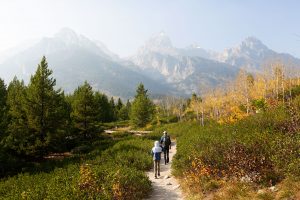
Image by Brandon Farrell, Shutterstock
It’s easy to get stuck indoors staring at your laptop, TV or phone — even as an avid hiker or nature lover. And like a lot of people, you may find yourself indoors during certain times of the year or stuck in the daily grind and forget to make time to get outdoors and unplug.
But amid hectic schedule, taking a breather and stepping outside can be beneficial for your mental well-being.
In a 2017 article published by the National Library of Medicine, Jo Barton and Mike Rogerson studied the importance of greenspace for mental health. The researchers reported that “Environments shape human behavior …” and said, “Characteristics of nature environments can promote affordances both for acute positive psychological experiences and for physical activity that in turn promotes well-being.”
They also described physical activity in greenspaces as “green exercise.”

And there’s actually a scientific reason why you feel good outdoors in nature — it boosts your mood and improves your mental well-being. For example, think about how you feel hiking through the forest unplugged from all your devises, or paddling across a serene lake with the sun shining as you listen to birds sing around you. Or think about how you feel on a trail run in the mountains or sitting around a campfire after a day spending time outdoors.
The smells, the sounds and the air are so different in nature. And letting go of technology while you’re out in nature can elevate that serene feeling.
Let’s look at five benefits of unplugging and spending time in nature.
1. Increased Feelings of Calmness
Nature has a remarkable ability to soothe the mind and body. Whether it’s a leisurely stroll through a park or a hike in the woods, being surrounded by nature can promote a sense of calmness and relaxation.
Both correlational and experimental research have shown that interacting with nature has cognitive benefits — a topic University of Chicago psychologist Marc Berman, Ph.D., and his student, Kathryn Schertz, discussed in a 2019 article titled, Nurtured by nature.
Berman and colleagues found that spending time in nature can act as a balm for our busy brains.
“Even the sounds of nature may be recuperative,” he said, referencing research from 2019. Study participants who listened to nature sounds like crickets chirping and waves crashing performed better on demanding cognitive tests than those who listened to urban sounds like traffic and the clatter of a busy café.”
2. Boosted Happiness
Spending time in nature triggers the release of endorphins and dopamine, often referred to as the “feel-good” hormones. You hear this a lot from runners, commonly known as the “runners high.” These neurotransmitters promote happiness and overall well-being, helping to lift your spirits during stressful times.

Image by aaronj9, Shutterstock
There’s a reason why people have been quoted talking about happiness in nature for centuries. Like quotes from people like Henry David Thoreu, “I took a walk in the woods and came out taller than the trees,” Edward Abby, “Wilderness is not a luxury but necessity of the human spirit,” and Claude Monet, “The richness I achieve comes from Nature, the source of my inspiration.”
3. Enhanced Concentration
Have you ever noticed how much easier it is to focus after a refreshing walk outdoors? Or perhaps you have your best thoughts when you’re outside. Nature has a restorative effect on our attention spans, making it easier to concentrate and retain information even when we return to our indoor lives or work.
Detoxing from your digital devices can help you become more focused.
In an article in Psychology Today, titled, Nature’s Reset: Enhancing Mental Clarity and Focus, Dr. Dana Klisanin’s found that nature offers a powerful remedy to mental fog and stress.
“Engaging regularly with nature fosters neural growth and change,” said Klisanin.
4. Improved Mental Health
Studies have shown that spending time in nature can reduce symptoms of anxiety and depression. The tranquility of natural settings helps to alleviate stress and promote a sense of inner peace, leading to improved mental health outcomes.

The view from a spot on Skyline Drive in Shenandoah National Park. (Image by Nature Lovin’ Geek, Shutterstock)
The American Heart Association promotes spending time in nature to reduce stress and anxiety.
“Spending time in nature can help relieve stress and anxiety, improve your mood, and boost feelings of happiness and wellbeing. Whatever you call it – forest bathing, ecotherapy, mindfulness in nature, green time or the wilderness cure — humans evolved in the great outdoors, and your brain benefits from a journey back to nature.”
5. Physical Well-Being
Beyond its mental health benefits, nature also contributes to our physical well-being. Time spent outdoors has been linked to lower blood pressure, reduced levels of the stress hormone cortisol, and a strengthened immune system.
Plus, outdoor activities such as hiking or biking provide an enjoyable way to stay active and fit.
How to Get the Most Out of Your Time in Nature
To reap the full benefits of spending time in nature, consider these tips:
Commit to Regular Visits: Aim for a minimum of 2 hours per week in natural settings to significantly improve your health and well-being. Schedule nature outings as part of your self-care routine, prioritizing your health above other commitments.
Choose Safe Spaces: Ensure the places you visit feel safe and secure. Your time in nature should be a stress antidote, not a source of anxiety. Explore local parks, nature reserves, or trails where you can relax and unwind without worry.

Image by Aleksei Potov, Shutterstock
Be Present: Be present in the moment during your outdoor excursions. Take deep breaths, listen to the sounds of nature, and engage your senses fully. Mindfulness enhances the therapeutic benefits of nature, allowing you to fully immerse yourself in the experience.
See how it feels to turn off your devices and be present in nature.
Suzanne Downing is an outdoor writer and photographer in Montana with an environmental science journalism background. Her work can be found in Outdoors Unlimited, Bugle Magazine, Missoulian, Byline Magazine, Communique, MTPR online, UM Native News, National Wildlife Federation campaigns and more.
 Your Privacy Choices
Your Privacy Choices